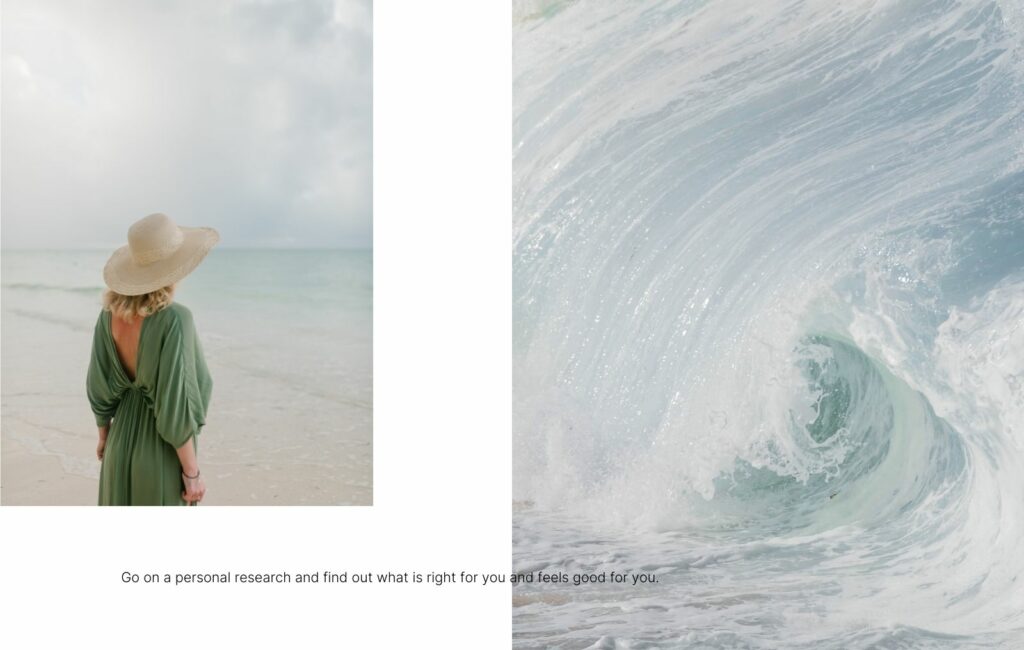In conversations, others often tell us that they have lost ease in life. We also know this feeling when life feels difficult from time to time. But how can it be that some people go through life with great ease and serenity, while it feels incredibly difficult for others?
At this point, it’s important for us to mention that it’s okay to feel bad, melancholy or sad sometimes. These emotions are part of life and should not be suppressed. However, if you feel depressed and sad for a long period of time, we recommend that you seek professional help, as these can be signs of a depression.
What does ease mean?
But what exactly does it mean to live a life in ease? Well, basically the definition is quite simple. We look at life with serenity, everything is possible. We are open to all experiences, we solve problems effortlessly. Serenity and ease mean inner peace and security. But please note, it is not about restraining yourself in order to suppress negative feelings.
The opposite of ease is melancholy. We wallow in our problems, ruminate, and find it difficult to deal with our thoughts and feelings.
Our favorite tips for more ease
Cultivating ease in your life is not difficult. It can be learned, like everything else. But in the first step you should ask yourself, what exactly does it mean to you? What does a life and especially an everyday life in serenity look like for you? What feelings do you associate with it? And very important: Are there already areas in your life where you live in ease? We can’t answer these questions for you, but we can present you our favorite things that bring us serenity:
Intuition and Trust
Control gives us a feeling of security when there is chaos around us. But in doing so, we block our full potential. Controlling can show itself in many different areas of life: We want to control what we eat and when, we want to control what we think and feel, we want to control how others perceive us, and so on.
But allow this thought: Don’t forbid yourself anything and let go. Let your intuition decide what is good for you and not your head. Enjoy life. Enjoy food. Enjoy doing nothing. You will notice, at the beginning it feels very strange, as if you have lost control. But that is exactly what we want to train. We surrender completely and trust that everything will happen for us. Everything will be fine, because everything happens the way it is supposed to happen.
If this sounds naive for you, that’s good. In this case we ask you to explore exactly why. Inner resistance is often a sign that your subconscious mind wants to protect you. What are you afraid of? What would happen if you let go and surrender?
Acceptance
From time to time, everyone falls into a mode where we actively fight against everything. We get upset about little things, get angry or want everything to go exactly the way we want it to. The result is that we are constantly living in a state of scarcity. We are in a struggle, with ourselves, other people or the current situations.
But why do we make it so difficult for ourselves? Negatives and setbacks are simply part of life. With compassion for yourself but also for other people, a non-judgmental perception, you can train to accept life as it is. Because sometimes we cannot control how we react in the heat of the moment, but we can always influence how we react afterwards.
Daily Meditation
Buddhism has taught the concept of equanimity for thousands of years. We shouldn’t mix up equanimity with carelessness! Equanimity or serenity means that we should detach ourselves from the things that are not good for us. There is no difference between good and bad. Everything happens for you. Even if something doesn’t go the way we want it to, this also has something positive. Even if you don’t see it right away.
And this brings us back to daily meditation. While mindfully observing your breath, you observe your thoughts and feelings in a completely non-judgmental way. Let them pass. With daily meditation, you strengthen your neural connections in the brain. And don’t worry, it doesn’t have to be 60 minutes a day. 15 minutes a day¹ is already enough.

Laughter
Sounds stupid, but it is very effective. Scientific studies² have shown that laughter not only makes you happier, but it also helps you be more positive and calm in many situations and in life. This doesn’t mean that you have to artificially laugh out loud for no reason (seems a bit weird, right?). Just grin from ear to ear for 60 seconds. The muscles and nerves in your face send signals to your brain, which then releases serotonin and endorphins.
Balancing stress
In stressful situations our body tenses up and we are anything but calm and full of ease. By paying attention to our breathing in such situations, we suddenly realize how tense we are. When we are stressed, our sympathetic nervous system³ is active and we breathe faster and shallower to get enough oxygen into our system. When we consciously take long, deep breaths, we counteract this and thus ensure relaxation (we activate our parasympathetic nervous system³, which ensures calmness and relaxation).
Resolving Hidden Barriers
Sometimes we don’t even know why we react the way we do. This is related to our beliefs and socialization. In the meantime, we’ve integrated schemas into our lives that conflict with our ease. For example, when we think that work or life in general must always be difficult. Since this topic of unconscious self-sabotage is very extensive, we have dedicated an entire article to it. When we systematically dissolve these blockages in our subconscious, we quickly notice how a burden leaves our shoulders.
Choose influences you want
We can always push ourselves with our willpower, but this is very tiring in the long run. The easier way is to use our willpower to create an environment that makes our tasks and life easier. Regular and consistent habits and rituals help our brain not to need energy every time to overcome hurdles.
An important aspect is also the influences we let into our lives every day. The people we spend time with, the media we consume. If you notice that you are more tense or unbalanced after these activities than before, then this can be an indication for you to reduce these activities. On the other hand, when we spend a lot of time with people who go through life with ease, that ease transfers on our lives as well. In both cases, this is related to mirror neurons in our brain, where we unconsciously copy the behavior in our head and thereby learn it ourselves.⁴
These were our favorite things on how to cultivate and nurture ease and serenity in life. But as already written above, it can be different things for everyone. Go on a personal research and find out what is right for you and feels good for you. You already have all the answers within you. And since you have read this article here, you seem to have made a decision: Namely, to live a life with ease and serenity. And that’s great. Be proud of yourself!
Studies
¹ https://www.tandfonline.com/doi/full/10.1080/17439760.2019.1610480
² https://www.ncbi.nlm.nih.gov/pmc/articles/PMC6125057/, https://pubmed.ncbi.nlm.nih.gov/27439375/
³ https://www.ncbi.nlm.nih.gov/pmc/articles/PMC6137615/
⁴ https://en.wikipedia.org/wiki/Mirror_neuron

